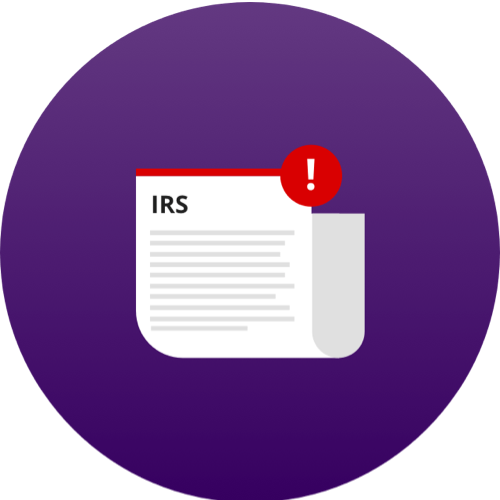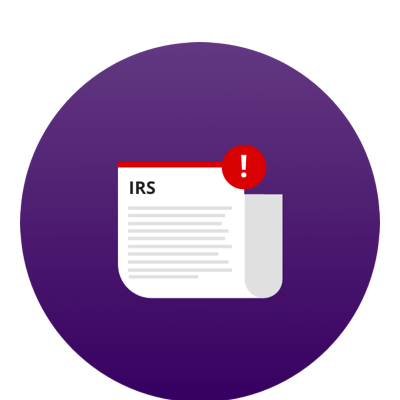- Find an office
-
File Your Taxes
 Find a Location
Find a Location -
Resolve Tax Issues
 Resolve Tax Issues
Resolve Tax IssuesResolve Tax Issues
-
Tax Resources
 See all Tax Help
See all Tax HelpTax Tools
Tax Tips & Resources
- Where's My Refund
- Refund Advance
- Promotions & Coupons
- Hiring Local Jobs!
- Careers
- Search
- Contact Us
- Feedback
-
 Log in | Sign up
Log in | Sign up

JH Accounts
|
|
Oh no! We may not fully support the browser or device software you are using ! To experience our site in the best way possible, please update your browser or device software, or move over to another browser. |
Back taxes and tax debt
If you’re getting letters from the IRS about tax debt, you probably have a lot of questions about what to do next and how to handle paying the IRS. We have answers.

What is tax debt?
Guide to tax debt and relief

When you owe back taxes, it can be overwhelming. We can help you better understand everything so you can get back on track.
{{ videoPreTitle }}
{{ videoTitle }}
{{ videoDescription }}
Back taxes
How to pay back taxes you owe to the IRS
If you’re getting letters from the IRS about your tax debt, you probably have a lot of questions about what to do next and how to handle paying the IRS. We have answers! Read on to learn more about your options and where you can turn for help when paying your back taxes.
How much do I owe the IRS? How to find out if you owe back taxes
Back taxes are simply money that you owe to the Internal Revenue Service. When you don’t pay your taxes or pay the wrong amount, you owe “back taxes.” If you continue to miss payments, you have “tax debt” that the IRS will try to collect.
12 Things to Know About IRS Wage Garnishments (And How to Get Them Released)
When taxpayers owe the IRS and are not in an arrangement to pay or defer the tax liability (via extension to pay, payment plan, currently not collectible status, or an offer in compromise), they can be subject to a levy of income and assets.
How to file back taxes without records
If you're missing records that you need to file your taxes, this can complicate and delay the process of catching up on your tax returns. Here's what you can do if your records are missing and you want to file your back taxes with minimal delays.
Can you get a mortgage if you owe back taxes to the IRS?
In short, yes, you can. Having tax debt, also called back taxes, does not preclude you from qualifying for a mortgage by sheer virtue of having it. The long answer is that whether or not you will get the mortgage has less to do with the IRS, and more to do with the lender's guidelines.
How do I contact the IRS?
You can contact the IRS by phone, mail, or walking in/making an appointment at a local Taxpayer Assistance Center. The IRS typically does not email taxpayers.

Featured
Five steps to take if you owe taxes and can’t pay

It’s a terrible feeling. You’ve entered all of your information on your annual income tax return and find that you owe the Internal Revenue Service—and not just a little, but more than you can afford to pay.
Resolving Tax Debt
What happens if the IRS sends you to collections?
When you receive a tax bill, it’s important to take some form of action regardless of whether you agree with the assessment or have the means to pay. Ignoring the bill is never a good idea because the IRS starts the countdown for their collections process.
How to apply for tax debt relief or forgiveness from the IRS
The good news? Tax debt relief is possible. The not-so-good news? Not everyone qualifies for a settlement, but there are several options to explore and consider. The IRS offers a variety of tax debt relief programs and a lot of online tools and forms to make it easier to apply for them.
IRS fixed term payment plans (36-month, 72-month, full-pay)
Each year, millions of taxpayers set up an IRS payment plan when they cannot pay what’s owed upon filing their returns. IRS statistics show that over 70% use one of these payment plans.
How to settle tax debt for less
You might have heard about how it is possible to settle your IRS tax debt for less than the actual amount you owe. While it is not possible to get the IRS to let you off easily, there are some circumstances where you might be able to work out an Offer in Compromise (OIC).
What is the IRS “Fresh Start Initiative”?
Many taxpayers who owe back taxes to IRS still hear about the IRS “Fresh Start” Initiative on the airwaves. Many advertisements also tout Fresh Start as an opportunity to settle back taxes with the IRS.
How long does it take for IRS Penalty Abatement?
IRS penalty abatement can be done in a phone call to the IRS but can take years in certain cases. It typically depends on the type of penalty and relief that you are seeking.
How to get an IRS tax levy released
The Internal Revenue Service (IRS) has a variety of options to satisfy delinquent debts owed by taxpayers. Some of its more infamous options include federal liens, wage garnishment, refund offsets, and levies.
What is Innocent Spouse Relief and how do I qualify?
For richer and for poorer? Absolutely, and when it comes Innocent Spouse Relief, even divorce and a court decree may not stop the IRS from pursuing unpaid taxes.
The New IRS Payment Plan Option for High-Debtors: Non-Streamlined Installment Agreements
During the IRS COVID-19 shutdown, the IRS got kinder to high-tax debtors. The IRS announced a new payment plan that now allows tax debtors who owe up to $250,000 to pay on easier terms. The best feature of this new payment plan is that it is very easy to set up with the IRS.
IRS Levy on a Self-Employed Person or Independent Contractor: One-time or Continuous?
IRS levies are issued against taxpayers who have been given the chance to pay their debts and have not paid or secured a collection alternative. Most IRS levies are issued by an automated collection system (systemic levies).
How long does it take to get into an IRS collection agreement?
Millions of taxpayers each year cannot pay their taxes. In 2019, there were 16.8 million individual taxpayers who owed the IRS. Each year, between 4-5 million taxpayers have to get an installment agreement, extension to pay, or another more complicated IRS collection alternative to full payment.
When Does Payment Deferral or “Currently not Collectible” End with the IRS?
If you cannot pay your taxes, the IRS may put you in currently not collectible status (“CNC” or “Status 53”). What this means is that you cannot pay now, but you may be able to pay later.
What IRS returns qualify for First-time Penalty Abatement Relief?
For certain failure to file and failure to pay penalties and the failure to deposit penalty (employment tax), the IRS accepts a “First-time Penalty Abatement” defense (see the Internal Revenue Manual Section 20.1.1.3.3.2.1.) First-time penalty abatement (FTA) allows the IRS to remove certain penalties from your account based solely on your clean compliance history.
Top-10 Taxpayer Disputes with the IRS
Each year, the IRS National Taxpayer Advocate (NTA) issues their Annual Report to Congress. This report is great reading for taxpayers who want to know common disagreements and issues between the IRS and taxpayers.

Featured
How to setup an IRS payment plan or installment agreement

Identifying the best installment payment plan and qualifying for it can be confusing, so it’s important to understand the basics of what these plans are and how they work.
OFFER IN COMPROMISE
The “real” cost of an IRS Offer in Compromise (OIC)
When taxpayers cannot pay their tax bill with their assets and monthly income, they may qualify for the IRS’s Offer in Compromise (OIC) program. The OIC for “Doubt as to Collectibility” allows taxpayers who are unlikely to be able to pay the IRS before the collection statute expires to settle their tax bill for less than the full amount.
What Is an IRS Offer In Compromise
An Offer in Compromise (OIC) is an IRS program that allows taxpayers to settle their outstanding debts for a lower amount than they owe. The IRS may reject the offer if it doesn’t meet their approval threshold, leaving taxpayers no option but to file an appeal or look to another IRS collection alternative (payment plan, currently not collectible status, extension to pay).
Will the IRS Accept More Offers in Compromise Post-Covid? Here’s Why and Why Not
The IRS Offer in Compromise (OIC) has always been a program with much controversy and confusion. Currently, there are over 20 million individual and business taxpayers who owe the IRS, but very few get an Offer in Compromise.
How Does the IRS Calculate My Reasonable Collection Potential for an Offer in Compromise?
A taxpayer may qualify for an offer in compromise (OIC) if the taxpayer cannot pay their tax bill with equity in assets and monthly installment payments before the collection statute of limitations expires. In an OIC, they can potentially settle their tax bill by offering the IRS their “reasonable collection potential” or “RCP.”

Featured
Passport revocation or denial for severe tax debt

Having delinquent tax debt can have harsh consequences. This makes it important for you to understand the consequences and how to resolve these issues. One of those consequences is the government can stop you from getting, or seize, your passport.
Related content and resources
When every dollar matters, it matters who does your taxes™
-
TRUSTED GUARANTEES.
Be 100% certain about your money & your taxes, year after year.
-
NATIONAL PRESENCE. LOCAL HEART.
We’re in your neighborhood & inside your favorite Walmart store.
-
40+ years. 60+ million returns.
The kind of trusted expertise that comes with a lifetime of experience.

